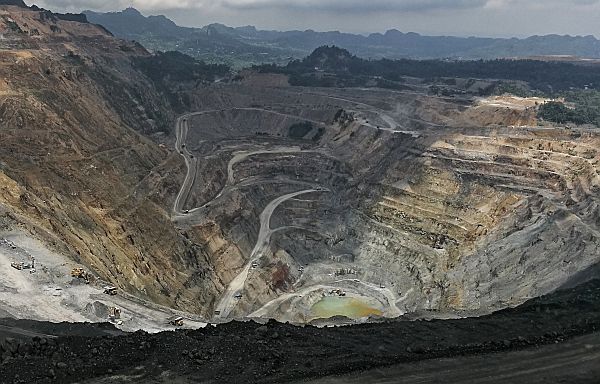
CARMEN PIT, Carmen Copper Corporation
CDN PHOTO/CHRISTIAN MANINGO
After a turbulent year filled with company closures and scrapped deals, several mining firms in the Philippines are now considering the idea of policing their own ranks.
Enrico Nera, president of the Toledo City-based Carmen Copper Corporation (CCC), said there has been ongoing discussions among mining professionals to form a self-regulatory organization following the events that the mining industry faced under the leadership of former Environment Secretary Gina Lopez.
“After the events of the past year, we realized that we need to step up and start policing ourselves,” he told reporters during a tour around CCC’s facility last week.
To recall, Lopez ordered the closure of several mining firms in the country as well as scrapped at least 75 mining deals earlier this year.
The Department of Environment and Natural Resources (DENR) ordered 23 mines closed for ruining watershed areas and for “indiscriminate mining.”
Lopez later stepped up her campaign to stop extraction of resources in sensitive areas by ordering the cancellation of 75 mining contracts known as mineral production sharing agreements (MPSA) in watershed zones, many of which were still in the exploration stage.
The former secretary was replaced by Roy Cimatu after Lopez was rejected by the House Committee on Appointments.
CCC, which operates the Toledo copper mine, is a wholly-owned subsidiary of Atlas Consolidated Mining and is considered the largest copper mine in the Philippines.
Atlas was among the mining companies that passed the DENR’s audit, which began in August of 2016.
Nera said that once a company becomes a member of the proposed group, it is presumed that the firm practices responsible mining.
He said they could start the group with the compliant mining firms and expand its membership from there. The company official said he could not divulge the members of the organization’s core group yet.
“The challenge here is to raise the bar and extract the best from these mining companies,” said Nera.
He said they will still have to agree on the standards they would have to adhere to, whether it will be at par with the DENR’s or even higher.
Australian standards
One of the goals was also to benchmark practices on Australian standards, which are among the best in the world, said Nera.
He added that they were also open to partnering with the Chamber of Mines of the Philippines, an association “advancing the interest of mining, quarrying and mineral processing companies for the efficient exploration, development and utilization of minerals in consonance with sound economic, environmental and social policies.”
“It can be a joint activity with the chamber. The senior members can even help certify,” Nera said.
The DENR, through the Mines and Geosciences Bureau (MGB), serves as the regulatory body of the mining industry.
Among the measures that serve as the bedrock of the country’s mining industry are the Philippine Mining Act of 1995 and Executive Order 79.
Nera said they will continue to work with the DENR and affected local governments because they are in the best position to assess the impact of the mining industry.
He said they hope to form the group within this year.